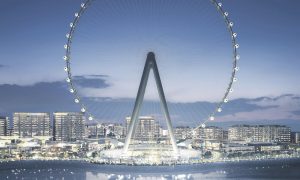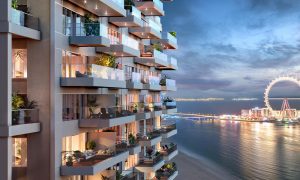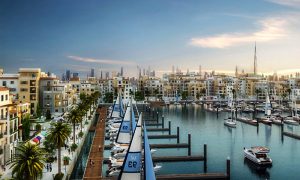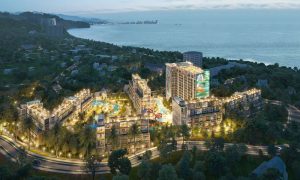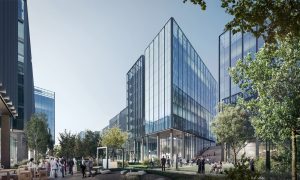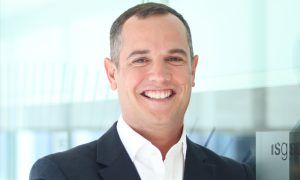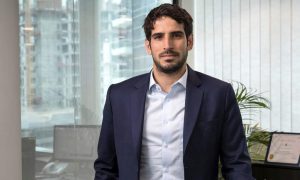In profile: Bishoy Azmy, CEO of ASGC
Al Shafar General Contracting boss on the changes at his company

Last year, when Al Shafar General Contracting (ASGC) boss Bishoy Azmy was interviewed by Big Project Middle East, he related the tale of how he brought his company back from the brink in the wake of the financial and real estate crisis. Back then, his mood was one of cautious optimism as he looked to position his company to take advantage of a Dubai market that was still a little unsure of where it was headed and how it was going to get there.
Eighteen months on from that interview, things have changed rapidly for this Dubai-based contractor, starting with the relocation of its company headquarters to a brand new space in Dubai Properties’ Bay Square project in the Business Bay area, which ASGC actually built.
It is here that Big Project ME meets Bishoy Azmy, in his office overlooking Dubai Creek, which encircles the burgeoning commercial district, a symbolic setting for this discussion about where ASGC is headed as 2016 looms.
“2015 has been a very good year for us, we grew significantly from 2014 and witnessed double-digit growth – maybe something north of 20% – which is healthy. We’re also working on interesting projects and we’re developing the company in terms of systems, procedures and technology,” Azmy says when asked to sum up the year just passed. “We’re being supported by a few good, key staff additions – people with different experiences and visions. So in general, it’s been a year where we’ve improved the company’s status on most fronts.”
This resurgence in fortunes is down to a strategy established back in 2009 and 2010, when the company was struggling to get back on its feet following the body blows it had taken during the financial crisis. “I still remember the crisis of 2008 and 2009, and the lessons learnt from that crisis, which were: focus on key strategic clients and focus on projects and sectors that are not cyclical. In addition, we’ve also decided to focus on larger projects.”
This new strategy has led to ASGC entering new territories in 2015, with the oil and gas sector a notable success for them. The contractor currently has three projects in operation with ADNOC and related subsidiaries. It is also building industrial plants, such as a factory for Nestlé, as well as projects in the education sector, with a secondary school under construction in Abu Dhabi.
“We’re also building key government establishments such as the Etihad Museum, which is a national, historical masterpiece for the UAE. We’re also building luxury hotels like the Marina Bloom in Abu Dhabi Marina, and we’ve got healthcare work – we’re building a hospital as part of our CityWalk development,” Azmy reveals.
Clearly, the strategic decisions that were taken a few years ago are now bearing fruit. However, despite the entry into new fields and sectors, Azmy says there are many other aspects to consider. In a market as competitive as Dubai, one crucial element is the development of client relationships. Contractors often aren’t just chosen on their body of work, but also on the relationship a client has with them.
When contracts have tight deadlines and fluid goalposts, it helps to have a strong relationship with your client, as many a contractor in the region will tell you. This not only helps you surmount problems and challenges rapidly, but also allows a certain amount of flexibility from both sides, as Azmy explains.
“We do a lot of research before targeting a few select clients, and then we bombard these clients with attempts at penetrating them and asking them whether we can work with them on any kind of project. And then we make a huge effort, firstly to secure at least one contract – profitable or not profitable – and once we secure it, we make sure that the client is happy.”
The key to this strategy is, as Azmy puts it, if the client is happy, then everything else falls into place. “If we have real client satisfaction, then everything else will come. You’ll have more work, you’ll be treated fairly and your payments will be fine. You won’t be left high and dry in the end, as clients will care for the long-term sustainability of one of their supply chain vendors, who are us,” he asserts.
As the calendar ticks over to 2016, it’s only natural for the CEO to take stock of the year just passed. Having seen his company post strong growth figures over the course of the year, the target now is to continue the trend of double-digit growth. Of course, Azmy is well aware that this won’t be easy in such a competitive market.
“The challenge now is finding projects that give you that growth without undermining the bottom line. It may not be so difficult to do that, but you might have to pick up work that’s not profitable, that has a very tight margin or has a lot of risk that may turn out sour in the end.
“Our challenge is to shift through the work out there and ensure that we succeed in getting projects that delivers correct final returns for our shareholders. Construction is a difficult business that depends on single-digit margins. If you’re not being paid, even if it’s only the last 10% for retention, then you’ve lost all your profit for the job.”
Perhaps this is why, despite having previously expressed an interest in the wider regional markets, Azmy is content to keep his focus on Dubai and Abu Dhabi, in addition to Egypt, where the firm also has two live projects – one with Emaar and the other with a local developer. Saudi Arabia, while obviously a market of enormous potential for any contractor, also poses significant risks and challenges, as he explains.
“At the moment, we feel that the region outside the UAE is quite challenging, and hence we’re quite happy being somewhat cocooned here in the UAE. Saudi Arabia is a bigger market than Egypt and even the UAE, and we’ve always said that this is the market we’d like to expand to beyond the UAE. But we feel that it is very, very challenging at this time. We’re waiting to see what happens with Saudi Arabia over the coming period. It may be a year or two before we decide whether or not we can successfully enter it.”
When asked why he’s so reluctant to enter the Kingdom’s market, Azmy is quick to point out an issue that has been a bugbear for many a contractor. “Payments are the biggest challenge for us to enter the Saudi market. Our understanding, based on discussions we’ve had and intelligence that we’ve received, is that contractors face challenges receiving payments, more so towards the latter half of the project.”
“This company is a for-profit organisation that is designed to maximise shareholder returns. If we feel that we’re going to face [difficulties in obtaining payments], even if it’s a fantastic environment in terms of work, size of projects and expansion and so on, but if we’re then unable to deliver returns to our shareholders, then to us there’s no point until these conditions improve.”
However, that doesn’t mean there won’t be a lot going on at ASGC over the next few years. Even with the company’s focus firmly fixed on the UAE market, there’s still plenty to do. The contractor is currently involved in two major Dubai projects that received a lot of media attention when they were announced – the Etihad Museum for the RTA, and the residential buildings for Meraas Holdings’ Bluewater Island.
With the market set to be increasingly competitive over the coming months, especially as the pace of construction picks up in the build-up to Expo 2020, Azmy says he’s confident that ASGC is now in a position to take advantage of whatever opportunities the market offers. Having hired a number of staff over the course of 2014 and 2015, he says that with a current staff size of about 14,500 (15% white-collar and 85% blue-collar), the contractor is now stable for the next year or so, with no plans for staff expansion in the pipeline in the near future.
However, that doesn’t mean that there isn’t a focus on improving operations. With ASGC consisting of a number of subsidiaries, such as Hard Precast Building Systems, Assent (steel engineering), Al Shafar Interiors, Al Shafar United Electro-mechanical Engineering and Emirates Beton, the divisions need to pull their own weight and contribute towards the group’s success, which Azmy is very clear about.
“Some of the divisions are doing very well, and some are struggling. So the ones that are doing well, we’re very happy with our support team. The ones that are struggling, we’re reviewing their operations and making the necessary adjustments where needed,” he states.
“I believe that management is key. There are two factors [that can affect business]. Markets – there’s only so much you can do if you’re in a market and it’s very competitive, but at the same time, management is key, at least when it comes to maintaining market position so that you don’t fare worse in the market. In fact, you’ll fare slightly better, even if you’re bound by that market range, if you have good management.
“In companies where we’ve had spectacular management, we’ve had better than expected market results. In companies where we’ve had acceptable management, we’ve achieved market results. And in companies where we’ve had dismal management, we’ve achieved below market results, so those are the ones we’ll obviously have to change,” he asserts.
No matter how things were in the past, change is certainly coming to ASGC and its subsidiaries, and the CEO is going to be at the forefront.



